The Women of Grimdark: Cameron Johnston In Conversation With Anna Stephens
Cameron Johnston interviews the fantastic Anna Stephens, author of Godblind, and the writer of a particularly wince-inducing scene involving a hammer that will stay with him for a long while.
Hi Anna,
Welcome, and thank you for answering a few questions for us. Godblind was one of the biggest fantasy debuts of the last few years, so we are very keen to find out about your experience of being a female writer of grimdark fiction.
What appeals to you about writing grimdark fiction?
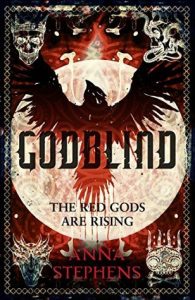 Anna: All fiction is the world writ just a little bit larger, a little brighter (or darker), a little more dramatic or introspective or frightening or funny. It’s the human experience made bigger.
Anna: All fiction is the world writ just a little bit larger, a little brighter (or darker), a little more dramatic or introspective or frightening or funny. It’s the human experience made bigger.
Grimdark allows us to explore the full range of human emotion, all the way from rage to bliss with stop-offs at boredom, fear, lust, depravity and apathy. Grimdark takes characters and puts them in dire situations to see what happens – how long can a person maintain hope in the face of unremitting bleakness? How desperately do they cling to any shred or possibility of joy when death is certain?
For me, grimdark isn’t about plumbing the depths of my own depravity to shock the reader; it’s about exploring just what people will do when everything appears to be lost. I’m concerned with finding the reasons to keep going when there seems to be no point, the lies people tell themselves to justify their actions – for good as well as bad – and the lies and truths people tell each other to encourage them to live just one more day.
At what point does a clean-cut hero stop being a hero? How many callous or ill-thought-out decisions does it take?
Grimdark for me is people in extremis finding the will and the hope and the reason to keep going, exposing their hearts and souls to one another in an attempt to give meaning to a life that’s meaningless. That, to me, is beautiful and it’s a story worth telling.
And on top of that, if that wasn’t enough, there’s all the fun of writing epic battles and dirty street brawls and evil priests and power-mad thugs and crazy women and sociopaths and rebellious slaves.
How does your martial arts background affect your fight scenes?
Anna: It’s one of the most important and useful skills I have to inform my writing and I use it constantly, not just for an actual fight scene but when thinking about characters moving through terrain or staying concealed. It also helps flavour scenes where the threat of violence, not violence itself, is present. A simple line where a character shifts his feet slightly will speak volumes to a fighter or martial artist who recognises it.
An awful lot of people, myself included, use standard movements such as “her hand hovered near the hilt of her knife” to indicate a rise in tension, but if you can add in foot movements or stances, where the eyes are looking, where the centre of balance is, the awareness of breath and obstacles and other people etc, you add a much stronger layer of realism to the scene.
I also walk through all my fight scenes from the perspective of every character, making sure that every step, block, strike or duck works in practice. It can take hours to make sure characters are moving in the right direction and the right way to evade or die, depending on their fate. It looks really weird and I draw diagrams incomprehensible to anyone but me that indicate different fighters at different stages, but it works. And it’s important to me that those fights and battles are as realistic from a physical standpoint as I can make them. Once that framework is laid in, I can concentrate on the emotions, senses and outside factors that give the scene depth.
Why do you think female authors of grimdark fantasy are so rarely mentioned when people ask for recommendations? With the release of a new wave of grimdark fiction written by women over the last few years, do you feel that things are finally changing?
Anna: I firmly believe that fantasy is still seen as the purview of male readers. ‘Serious’ fantasy about ‘serious’ subjects like war can only be written by men for men. It’s such a prevalent attitude that we’re almost blind to it and because of that, our names don’t get mentioned when and where they should.
For example, when I first announced I had a book deal, every single person at my place of work – every single one – asked me if I was going to be the next JK Rowling – because to them, a woman writing fantasy means she’s writing books for children about children. My go-to correction was “it’s more Game of Thrones than Harry Potter” because I thought they’d understand the distinction I was making. The usual response was “oh, so lots of sex, then?”. They were still incapable of making the leap from ‘woman writer’ to ‘battle scenes’.
It’s depressing how regularly the following discussion turns up on fantasy forums: “women don’t know how to write fight scenes.”
It’s a breathtakingly sweeping statement and the arrogance of it floors me every time. As though women don’t understand pain or fury or fear, as though we can’t write with empathy or skill. In the age of the #MeToo movement, I can guarantee that every female writer I know, grimdark or not, understands exactly what it’s like to feel threatened, frightened, angry but helpless, alone against a superior force. We can pour that into our work and give it a realism that you can taste. Yet we’re still supposed to not have any ability to write about the horrors of war.
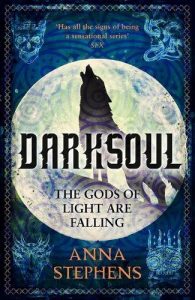 I’m a martial artist who has twice (so far) had to use what I’ve learnt to save myself from a very nasty situation. Deborah Wolf served in the US military, other writers I know are martial artists or practise fencing or archery or HEMA or a myriad other things. We do know, and like male writers everywhere, we do our research as well.
I’m a martial artist who has twice (so far) had to use what I’ve learnt to save myself from a very nasty situation. Deborah Wolf served in the US military, other writers I know are martial artists or practise fencing or archery or HEMA or a myriad other things. We do know, and like male writers everywhere, we do our research as well.
All that said, and as you can see it’s something I’m very passionate about, I do think attitudes are changing, albeit slowly; I know an awful lot of male readers who’ve had nothing but good things to say about the recently published women writers, and that gives me hope, as do all the women readers who are loving our work. But I believe those readers are still in the minority, which saddens me. All we can do is keep showing up – at conventions and appearances, in panel events, on social media – and keep on proving something we shouldn’t really have to prove until people can’t pretend we’re not here anymore. Because we’re going nowhere.
Godblind was very dark and brutal in places, and it is no mistake that it is on my list of grimdark books. But the original version way back in 2004 was a very different creature, and more about brave and noble warriors rescuing resourceful but helpless princesses from evil men. So what happened to evolve Godblind into the dark and dangerous beast we now know and love? Was it a growing dissatisfaction with the fantasy fiction you were reading at the time? Or did you change first and that then became reflected in your novel as you rewrote it?
Anna: I’d been training in karate for five years at that point, and I started asking myself why I was writing most of my female characters as fairly incapable of looking after themselves (the answer was that was how most of the fiction I read presented them, which I began to find extremely irritating but at that point thought if I wanted any chance of getting published, I needed to emulate those tropes).
But the more I looked at the characters I’d created and the gender divisions I’d put in there voluntarily, the more I realised it was the biggest fundamental issue I had with the whole story and I couldn’t put up with it any longer – I wasn’t representing myself in my own fiction, at least not in the characters who share my gender.
Don’t get me wrong, I’m not saying I’m some sort of killer ninja, but I’m certainly not a helpless damsel either. So why was I assigning that to all my female characters? That was the biggest step forward, rewriting a character – and then adding more so the gender split was far more equal – to be strong, capable and equal to her peers.
Then I looked at different types of female strength, which is where both Lanta and Gilda came from – Lanta as the power-hungry, manipulative and ambitious priestess, and Gilda as the older woman with powerful wisdom who nevertheless teaches rather than coerces.
And once I’d started asking these questions, I couldn’t stop: why were all my male characters heroic? Thinking about this helped me shape Dom’s personality – some readers have said they find him quite irritating early on in Godblind, full of self-pity, and that is very intentional. At one point he says to Rillirin, I don’t want to be the calestar (the prophet) I just want to be a warrior like everyone else. He doesn’t want the burden thrust upon him, but he can’t escape it and he rails against that.
All of those things combined to result in the novel becoming grittier and morally grey. When the women fight alongside the men, the stakes change – if they’re not waiting to be rescued, then the armies can’t be fighting over them. They have to be fighting for something greater. All of which helped to develop the over-arching political and religious narrative.
As for what I was reading at the time, there were some novels that were asking the same questions as I was, but I wasn’t necessarily aware of them. I was in the trap of so many other readers, being recommended the same names over and over and so missing out on other exceptional authors who were focusing more on feminism and realism instead of the same old tropes.
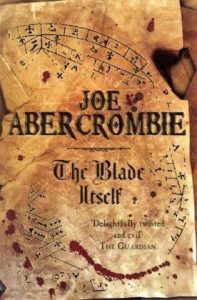
There definitely wasn’t much focus on inner life and turmoil in the fantasy I read. Heroes in those books never got PTSD; they never doubted they were right or what they needed to do; they didn’t seem to worry about losing, or feeling bad for the families of the enemies they’d killed. Godblind is an exploration of those things and others – again, the focus being on the normality of the characters. The act of examining feelings of guilt and fear does, I think, lend itself to a darker approach to fiction as, of course do characters who believe, utterly and without question, that they are right. Political and religious fundamentalism is the antithesis of a fluffy character arc!
Discovering Robin Hobb was a woman was a game-changer, and reading The Blade Itself by Joe Abercrombie gave me a big boost too – I loved the character of Ferro. She was a woman/half-demon, a fighter, a killer and thoroughly unlikeable. So of course I loved her. She was different and compelling because of it. As was Jezal dan Luthar – the man was a pretty coward who cared more about his looks than anything else and that again helped me realise that diversifying my characters was not only possible but publishable.
Finally, I think a lot of it had to do with my emerging style and voice. I don’t write ‘pretty prose’; it tends to be sparse and functional, so that when I do include descriptions of moments, feelings or places, they have (hopefully) a greater impact. That lean, muscular writing style started influencing the things I was talking about; it’s hard to describe a fluffy, helpless princess when using that sort of language because they don’t necessarily sit well together, and I began to realise that my style and the themes and issues I wanted to address complemented each other really well.
Do you have any favourite dark and gritty fantasy novels?
Anna: I have lots! Assassin’s Apprentice (or any Robin Hobb), The Religion by Tim Willocks (which is strictly historical fiction is but is grimdark turned up to 11; also check out his Green River Rising – astonishing), The Heroes by Joe Abercrombie, The Mirror Empire by Kameron Hurley, All the Windwracked Stars by Elizabeth Bear… the list could go on.
Godblind has been incredibly well received by readers, and with the sequel, Darksoul, out on August 23rd, what can we eager readers look forward to seeing now that the Red Gods have risen?
Thank you. Darksoul opens a few weeks after the climactic scenes of Godblind. Rilporin is now fully under siege, with the defenders fighting a desperate battle of survival and hoping against hope that reinforcements will come, while we learn the fates of those characters ambushed in the tunnels.
Things deteriorate in the worst possible way for some characters (Dom especially) while others see secrets come to light. Twists and turns aplenty as the armies fight for the city and seat of government, and a few major characters may or may not live to the end of the novel. Destinies manifest as people are pushed to their physical and mental limits.
Who will win? You’ll have to read it to find out!
Anna Stephens is the author of Godblind and Darksoul.
Cameron Johnston is the author of The Traitor God.

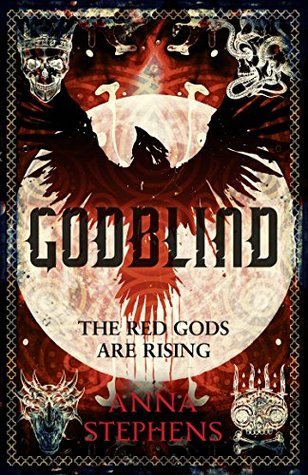
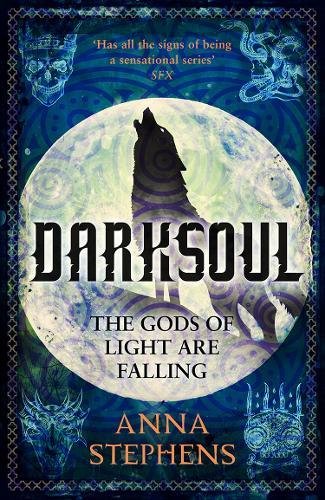
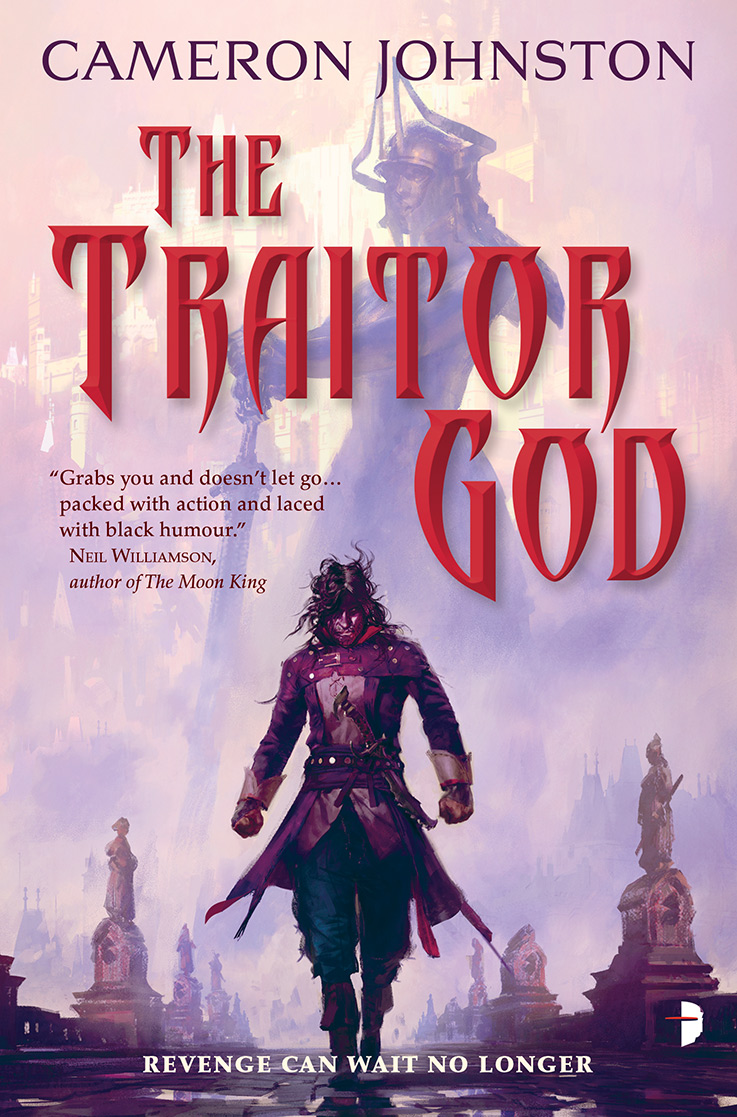
[…] to read a more… conventional interview with Anna, you can check out Mike’s interview, Cameron’s interview, or our author […]
[…] Part 1 of The Women of Grimdark Anna Stephens answered some searching questions, told us more about her experience of being a woman […]